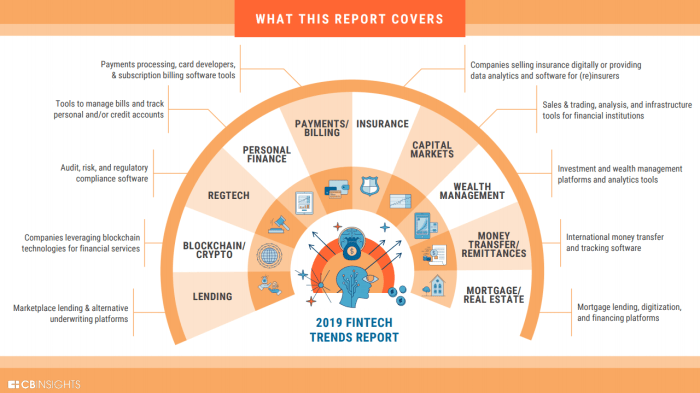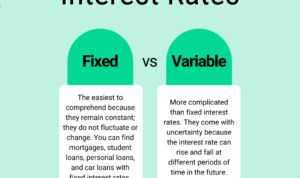Step right up to the cutting-edge world of fintech where technology meets finance in the most innovative ways. Brace yourself for a rollercoaster ride through the evolution, impact, and emerging trends that are reshaping the financial landscape as we know it.
Get ready to dive deep into the realm of fintech and discover how it’s revolutionizing the way we handle money and transactions.
Overview of Fintech
Financial technology, or fintech, refers to the use of technology to provide financial services and products. This includes mobile banking, cryptocurrency, robo-advisors, and peer-to-peer lending platforms. Fintech has revolutionized the way we manage our finances and interact with financial institutions.
Key Components of Fintech
- Mobile Banking: Allows users to perform banking activities on their smartphones or tablets, such as checking balances, transferring funds, and paying bills.
- Cryptocurrency: Digital currencies like Bitcoin that operate independently of traditional banking systems, offering secure and decentralized transactions.
- Robo-Advisors: Automated platforms that use algorithms to provide investment advice and manage portfolios, often at lower costs than traditional financial advisors.
- Peer-to-Peer Lending: Platforms that connect borrowers with individual investors, cutting out traditional financial institutions and potentially offering better rates for both parties.
Evolution of Fintech in the Financial Industry
Fintech has rapidly grown in recent years, disrupting the traditional financial sector. Initially focusing on payment processing and peer-to-peer lending, fintech has expanded to include a wide range of services, from personal finance management apps to blockchain technology. As more consumers adopt fintech solutions for their financial needs, traditional banks and financial institutions are forced to adapt or risk becoming obsolete.
Impact of Fintech on Traditional Banking
Fintech has revolutionized the financial industry, challenging traditional banking practices and pushing for innovation in services and customer experience.
Comparison of Fintech and Traditional Banking Services
Fintech services offer quicker and more convenient financial solutions compared to traditional banks. For example, mobile payment apps allow users to transfer money instantly, while traditional banks may take longer to process transactions.
Examples of Fintech Disruption in Traditional Banking
Fintech companies like Square and PayPal have disrupted the traditional banking sector by offering online payment solutions without the need for physical bank branches. This has forced traditional banks to enhance their online and mobile banking services to compete.
Adaptation of Traditional Banks to Fintech Innovations
Traditional banks are adapting to fintech innovations by partnering with or acquiring fintech companies to improve their digital offerings. Additionally, many banks are investing in technology to enhance their customer experience and streamline their processes to remain competitive in the evolving financial landscape.
Emerging Trends in Fintech

In the rapidly evolving landscape of financial technology, several key trends are shaping the future of the industry. From blockchain technology to artificial intelligence (AI) and digital payments, fintech is constantly innovating to meet the changing needs of consumers and businesses.
Blockchain Technology
Blockchain technology, originally developed for cryptocurrencies like Bitcoin, has revolutionized the way financial transactions are conducted. Its decentralized and secure nature allows for faster and more transparent transactions, reducing the need for intermediaries and lowering costs for users.
Artificial Intelligence (AI)
AI is playing a crucial role in fintech by enabling personalized recommendations, fraud detection, and risk assessment. Machine learning algorithms analyze vast amounts of data to provide insights and improve decision-making processes, ultimately enhancing the overall customer experience.
Digital Payments
The shift towards digital payments is transforming the way people manage their finances. Mobile wallets, peer-to-peer payment platforms, and contactless payment methods are becoming increasingly popular, offering convenience, speed, and security in transactions.
Big Data and Analytics
Big data and analytics are essential components of fintech innovation. By harnessing large volumes of data, financial institutions can gain valuable insights into customer behavior, market trends, and risk assessment. This data-driven approach allows for more informed decision-making and personalized services.
Regulatory Changes
Regulatory changes play a significant role in shaping the development of new fintech trends. Compliance with regulations such as GDPR and PSD2 is crucial for fintech companies to ensure data security and privacy. Regulatory frameworks also impact the adoption of emerging technologies and the growth of the fintech industry as a whole.
Fintech Adoption and Customer Behavior
In the rapidly evolving landscape of financial technology (fintech), customer behavior is undergoing a significant transformation. The adoption of fintech services is reshaping the way people manage their finances and interact with banking institutions. This shift is driven by the convenience, accessibility, and personalized experience offered by fintech platforms.
Popular Fintech Apps and Platforms
- Venmo: A popular peer-to-peer payment app that allows users to easily send and receive money from friends and family.
- Robinhood: A commission-free investing platform that has gained popularity among millennials for its user-friendly interface.
- Mint: A budgeting app that helps users track their expenses, set financial goals, and manage their overall financial health.
Challenges and Opportunities of Customer Data Privacy
Customer data privacy is a crucial aspect of fintech adoption. While fintech platforms offer convenience and efficiency, they also raise concerns about the security and protection of sensitive personal information. It is essential for fintech companies to prioritize data security and transparency to build trust with customers.
“The balance between providing a seamless user experience and safeguarding customer data is a critical challenge for fintech companies in today’s digital age.”






